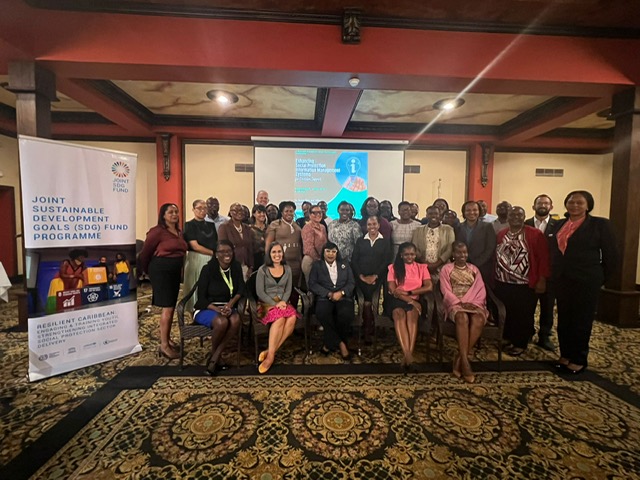Forty-five social protection stakeholders from countries within the Organisation of Eastern Caribbean States (OECS) are now better equipped to implement Social Protection Information Management Systems (IMS). This is the result of a one-day workshop on Enhancing Social Protection Information Management Systems for Decision Support. The learning event brought together Permanent Secretaries and Directors from Human and Social Ministries, experts in social protection information systems, and development partners to exchange ideas, experiences, and lessons learned in the development and implementation of social protection IMS.

In delivering welcome remarks, Ms. Kimbalie Constant, Strategic Operations and Project Implementation Manager, Ministry of Social Transformation, Antigua and Barbuda, noted that the OECS region faces a variety of complex social and economic challenges, including poverty, inequality, unemployment, and climate change. She stated “To address these challenges, we must have access to timely and accurate data, and be able to analyze this data effectively to inform evidence-based policies and programs. Effective IMS and data management are therefore crucial to achieving our development goals.”
Led by facilitators from UNICEF and WFP, participants discussed defining principles of social protection IMS, best practices, guiding and operational frameworks, and managing and overseeing data and information systems. Strong focus was placed on the importance of the three dimensions of IMS - people, processes, and technology for successful implementation.
The workshop was organized within the framework of the SDG-funded Resilient Caribbean Joint Programme Engaging and Training Youth & Strengthening Integrated Social Protection Sector Delivery. The Joint Programme contributes to the islands of Anguilla, the British Virgin Islands, Grenada, St. Kitts and Nevis, and the wider Eastern Caribbean, through a partnership with the OECS Commission.
His Excellency Dr. Didacus Jules, Director General of the OECS, welcomed this joint initiative as a complimentary activity to the Technical Advisory Committee (TAC) and Council of Ministers (CoM) for Human and Social Development held under the theme “Touching Lives through Data-Driven Development”. The learning event was fully aligned with the theme as it contributed aptly to two of the recommendations emanating from the TAC meeting of Permanent Secretaries and Directors of Social Development who serve as the drivers of the Social Protection Agenda, namely:
1. Facilitate knowledge exchanges between countries; and
2. Contribute to capacity building.
The OECS Commission appreciates and encourages opportunities for partnerships such as these as it moves forward to implement the Social Inclusion Social Protection Action Plan (2023 - 2030).
Speaking on behalf of the Joint Programme, Riad Kathkhoda, Social Protection & Cash-Based Transfers Lead for WFP shared that this workshop is one of several initiatives implemented across the Eastern Caribbean under the joint programme. Celine Julia Felix, UNICEF’s Chief Social Policy and Social Protection, expanded on the type of assistance provided stating that “The Joint Programme has provided support to beneficiary countries at the policy, programmatic and systems levels. This includes support for the digitalization of social protection data systems based on thorough end-to-end process reviews. This type of intervention is expected to support the efficient and reliable implementation of social protection programmes, as well as enhance transparency and good governance of social protection systems.”
The Resilient Caribbean Joint Programme leverages the expertise of four participating UN organizations: ILO, UNESCO, UNICEF, and WFP. These agencies collaborate, under the leadership of the UN Resident Coordinator Barbados and the Eastern Caribbean to address challenges facing Caribbean Small Island Developing States including limited contributory social protection coverage, limited access to social protection for workers in the informal sector, and a need for coherent and gender-responsive labour market programming.
For more information please contact:
Tara Morris
Communications Consultant
Resilient Caribbean Joint Programme
taralgaskin [at] gmail.com
Note:
The Joint SDG Fund's joint programmes are under the prestige leadership of the Resident Coordinator Office and implementing United Nations Agencies. With sincere appreciation for the contributions from the European Union and Governments of Denmark, Germany, Ireland, Luxembourg, Monaco, The Netherlands, Norway, Portugal, Republic of Korea, Spain, Sweden, Switzerland and our private sector funding partners, for a transformative movement towards achieving the SDGs by 2030.



















